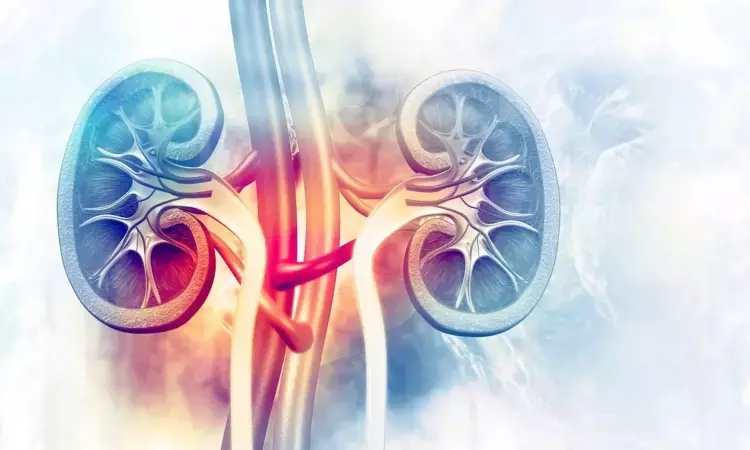- Home
- Medical news & Guidelines
- Anesthesiology
- Cardiology and CTVS
- Critical Care
- Dentistry
- Dermatology
- Diabetes and Endocrinology
- ENT
- Gastroenterology
- Medicine
- Nephrology
- Neurology
- Obstretics-Gynaecology
- Oncology
- Ophthalmology
- Orthopaedics
- Pediatrics-Neonatology
- Psychiatry
- Pulmonology
- Radiology
- Surgery
- Urology
- Laboratory Medicine
- Diet
- Nursing
- Paramedical
- Physiotherapy
- Health news
- Fact Check
- Bone Health Fact Check
- Brain Health Fact Check
- Cancer Related Fact Check
- Child Care Fact Check
- Dental and oral health fact check
- Diabetes and metabolic health fact check
- Diet and Nutrition Fact Check
- Eye and ENT Care Fact Check
- Fitness fact check
- Gut health fact check
- Heart health fact check
- Kidney health fact check
- Medical education fact check
- Men's health fact check
- Respiratory fact check
- Skin and hair care fact check
- Vaccine and Immunization fact check
- Women's health fact check
- AYUSH
- State News
- Andaman and Nicobar Islands
- Andhra Pradesh
- Arunachal Pradesh
- Assam
- Bihar
- Chandigarh
- Chattisgarh
- Dadra and Nagar Haveli
- Daman and Diu
- Delhi
- Goa
- Gujarat
- Haryana
- Himachal Pradesh
- Jammu & Kashmir
- Jharkhand
- Karnataka
- Kerala
- Ladakh
- Lakshadweep
- Madhya Pradesh
- Maharashtra
- Manipur
- Meghalaya
- Mizoram
- Nagaland
- Odisha
- Puducherry
- Punjab
- Rajasthan
- Sikkim
- Tamil Nadu
- Telangana
- Tripura
- Uttar Pradesh
- Uttrakhand
- West Bengal
- Medical Education
- Industry
Corticosteroid therapy for IgA nephropathy can improve renal outcomes

In a recent study by Yu Wang and colleagues analyzed corticosteroid therapy as a potential treatment for IgA nephropathy (IgAN). This study published in the Nephrology Journal found that corticosteroid therapy may benefit the IgAN patients with moderate proteinuria by helping in proteinuria reduction and renal function preservation.
This comprehensive retrospective cohort study involved a total of 336 patients who were diagnosed with IgAN, with estimated glomerular filtration rates (eGFR) exceeding 15 mL/min/1.73 m² and moderate proteinuria levels ranging from 0.75 to 3.5 g/d.
The patients were divided into a group receiving corticosteroids and the other group undergoing supportive care. The efficacy was measured through complete remission, partial remission and no remission categories. The endpoint of the study was defined as a 40% reduction in eGFR, the onset of end-stage renal disease (ESRD) or renal disease-related death.
The outcomes from the study indicated that corticosteroid-treated individuals faced higher risks in terms of clinical and pathological progression factors. But, after adjusting for confounding factors, the logistic regression analysis surprisingly revealed a significantly higher remission rate in the corticosteroid group. The occurrence of serious adverse events between these two groups did not show any statistically significant difference.
The study employed propensity score matching to further validate these results by pairing 95 sets of patients with similar baseline characteristics. The outcomes demonstrated that corticosteroid-treated patients expressed higher overall and complete remission rates when compared to their untreated counterparts. The relatively short follow-up period of this study prevented the observation of significant differences in the incidence of the defined endpoint and survival analyses. This suggests that the corticosteroid therapy may hold promise for IgAN patients with moderate proteinuria that offers potential benefits in terms of proteinuria reduction and preservation of renal function.
Reference:
Wang, Y., Yu, J., Jiang, Y., Li, J., Yimamuyushan, A., Xia, X., Fan, L., Huang, F., Chen, W., & Liu, Q. (2024). Corticosteroid in IgA nephropathy with moderate proteinuria: A retrospective cohort study. Nephrology (Carlton, Vic.). https://doi.org/10.1111/nep.14269
Neuroscience Masters graduate
Jacinthlyn Sylvia, a Neuroscience Master's graduate from Chennai has worked extensively in deciphering the neurobiology of cognition and motor control in aging. She also has spread-out exposure to Neurosurgery from her Bachelor’s. She is currently involved in active Neuro-Oncology research. She is an upcoming neuroscientist with a fiery passion for writing. Her news cover at Medical Dialogues feature recent discoveries and updates from the healthcare and biomedical research fields. She can be reached at editorial@medicaldialogues.in
Dr Kamal Kant Kohli-MBBS, DTCD- a chest specialist with more than 30 years of practice and a flair for writing clinical articles, Dr Kamal Kant Kohli joined Medical Dialogues as a Chief Editor of Medical News. Besides writing articles, as an editor, he proofreads and verifies all the medical content published on Medical Dialogues including those coming from journals, studies,medical conferences,guidelines etc. Email: drkohli@medicaldialogues.in. Contact no. 011-43720751


